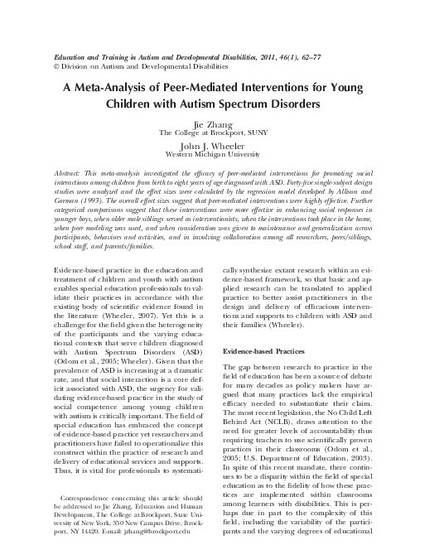
Article
A Meta-Analysis of Peer-Mediated Interventions for Young Children with Autism Spectrum Disorders
Education and Training in Autism and Developmental Disabilities
(2011)
Abstract
This meta-analysis investigated the efficacy of peer-mediated interventions for promoting social interactions among children from birth to eight years of age diagnosed with ASD. Forty-five single-subject design studies were analyzed and the effect sizes were calculated by the regression model developed by Allison and Gorman (1993). The overall effect sizes suggest that peer-mediated interventions were highly effective. Further categorical comparisons suggest that these interventions were more effective in enhancing social responses in younger boys, when older male siblings served as interventionists, when the interventions took place in the home, when peer modeling was used, and when consideration was given to maintenance and generalization across participants, behaviors and activities, and in involving collaboration among all researchers, peers/siblings, school staff, and parents/families.
Keywords
- peer-mediated interventions,
- autism spectrum disorders,
- young children
Disciplines
Publication Date
2011
Publisher Statement
© Division on Autism and Developmental Disabilities. This document was published with permission from the journal. It was originally published in the Education and Training in Autism and Developmental Disabilities.
Citation Information
Jie Zhang and John J. Wheeler. "A Meta-Analysis of Peer-Mediated Interventions for Young Children with Autism Spectrum Disorders" Education and Training in Autism and Developmental Disabilities Vol. 46 Iss. 1 (2011) p. 62 - 77 ISSN: 2154-1647 Available at: http://works.bepress.com/john-wheeler/27/
